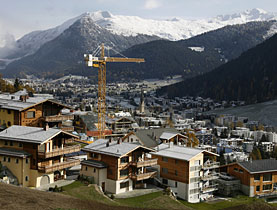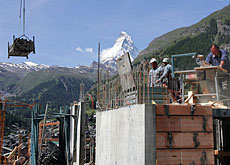Migration boom boosts property market

Switzerland's decision to open its borders to European Union workers has boosted the real estate sector by creating more demand for property, a report concludes.
The immigration wave has placed pressure on urban centres while the retail property sector is facing a soft landing as less favourable economic conditions start to bite, according to Credit Suisse bank.
Last year saw a net inflow of more than 80,000 foreign permanent residents, reinforcing an upward trend since the Swiss-EU bilateral agreement on the free movement of people that came into force in 2002.
This surge of new people will mop up the expected 42,000 residential units built this year. And Credit Suisse head of real estate analysis, Fredy Hasenmaile, believes the trend is sustainable in the short term.
“Immigration is much more volatile than the difference between birth and death that used to determine changes in population. But the fundamental economic conditions in Switzerland continue to be strong and this should attract more migrants for at least the next two years,” he told swissinfo.
This has led to changes in the residential market, with less demand for single-family dwellings and increased strain on towns and cities, leading to a growing disparity between urban and rural areas, the report indicates.
But while the residential sector has been booming for some years, the market for office space has only just begun to recover from a stagnant period.
Booming economic conditions have persuaded companies to seek larger premises, which has helped to unblock a logjam of empty office space. Credit Suisse predicts 22,000 new office-based jobs to be created this year and has noticed a rise in planning applications.
Retail problems
However, this phenomenon varies wildly from city to city. Zurich still offers about 250,000 square metres of empty office space while Geneva has only 36,000 square metres waiting for tenants.
Hasenmaile fears that some property developers will be caught out by the unsustainable boost in the retail market.
“We still have support from our strong economic development, but the peak is near and we will see a flattening,” he said.
“The problem is that we have too much supply. This will lead to a division between good locations, that will continue to thrive, and poor locations that could face severe problems in the future.”
Switzerland will not face the same problems the United States property market has witnessed in recent months because the sector is much less volatile here, according to the report.
Part of the reason is that only 40 per cent of Swiss own their own property compared with around 70 per cent in the US. Another reason is that Switzerland does not have the same exposure to problematic financial property-based instruments as in the US.
“Real estate does not have such a big impact on the economy as a whole compared to the US. But the construction still amounts to five or six per cent of the whole economy, so you cannot neglect this sector,” Hasenmaile said.
swissinfo, Matthew Allen in Zurich
The Swiss property market has recovered from the collapse of the early to mid 1990s that cost banks SFr42 billion ($37.6 billion).
Construction of new housing reached a 10-year high of 47,000 homes in 2005 and 42,000 in 2006. This year, some 42,000 new homes are expected to be built.
So far, the demand for new housing has matched supply, with the number of empty properties rising only slightly since 1998 to 1.06% in 2006. Demand is expected to reduce slightly in the following two years.
But Switzerland is not a country of homeowners, with the rate of ownership rising from just 31% in 1990 to around 37% at present.
In international comparison, the 34.6% Swiss home ownership rate in 2000 compared with 45% in Germany, 54% in France, 69% in Britain and the US, and 81% in Spain.

In compliance with the JTI standards
More: SWI swissinfo.ch certified by the Journalism Trust Initiative












You can find an overview of ongoing debates with our journalists here . Please join us!
If you want to start a conversation about a topic raised in this article or want to report factual errors, email us at english@swissinfo.ch.